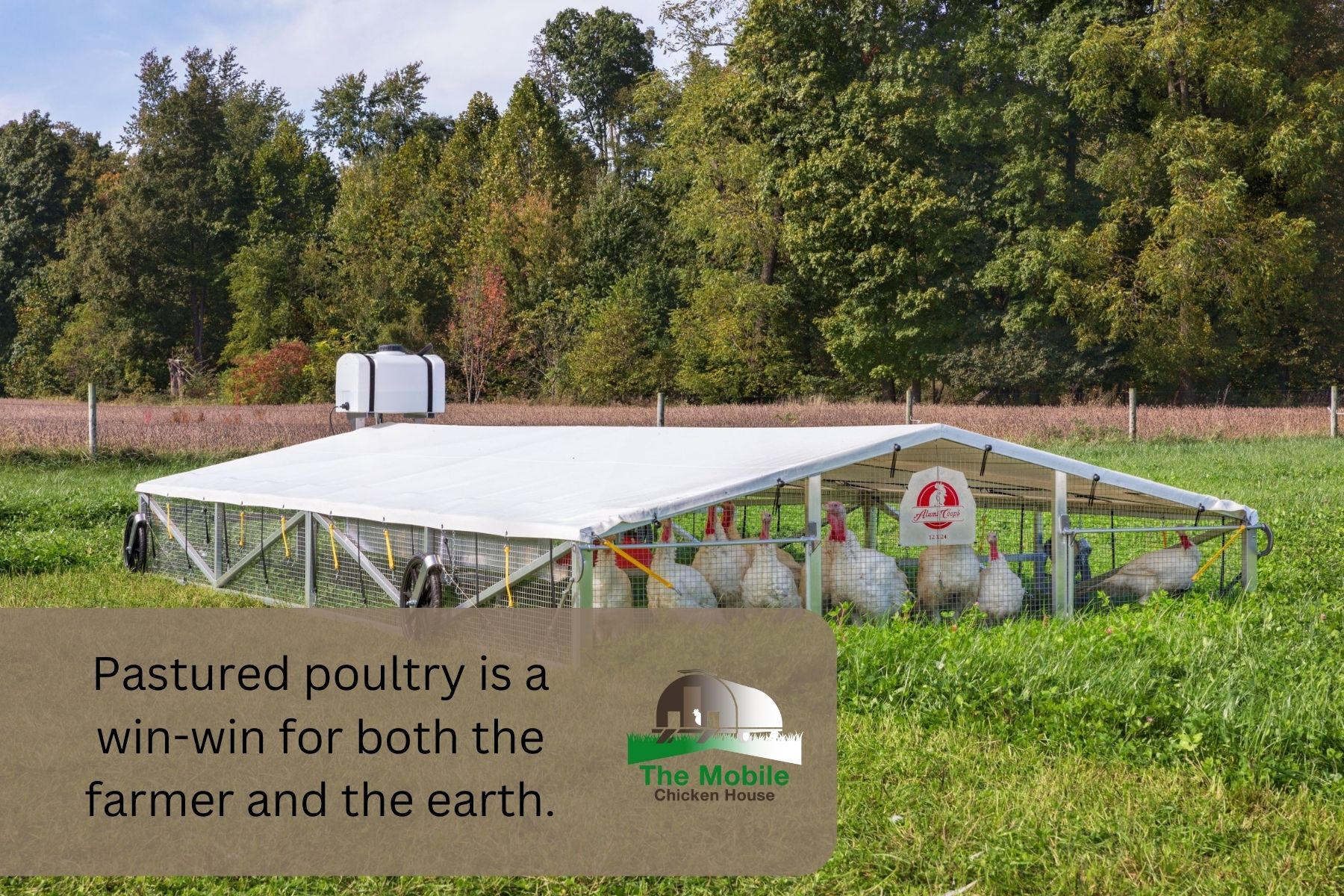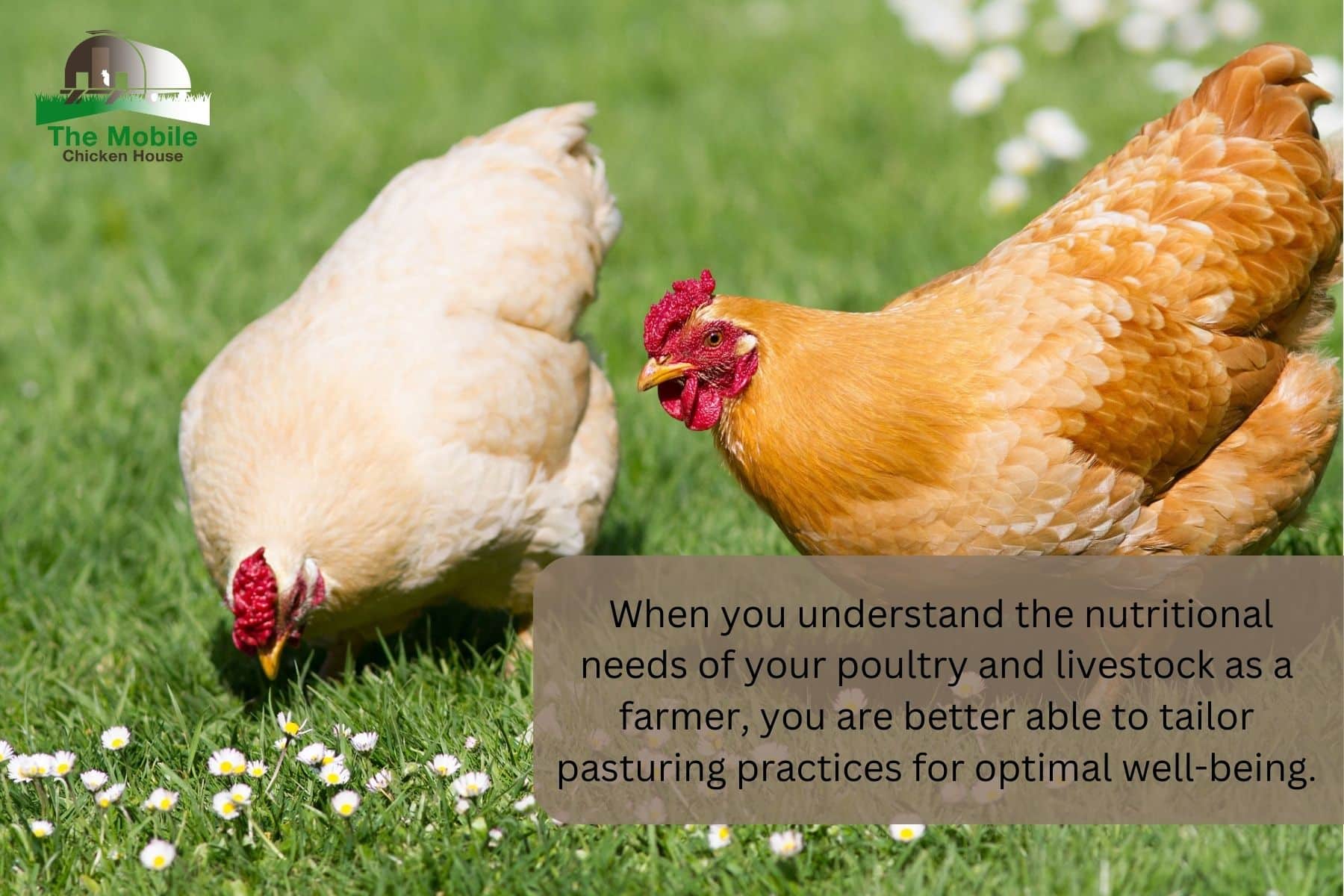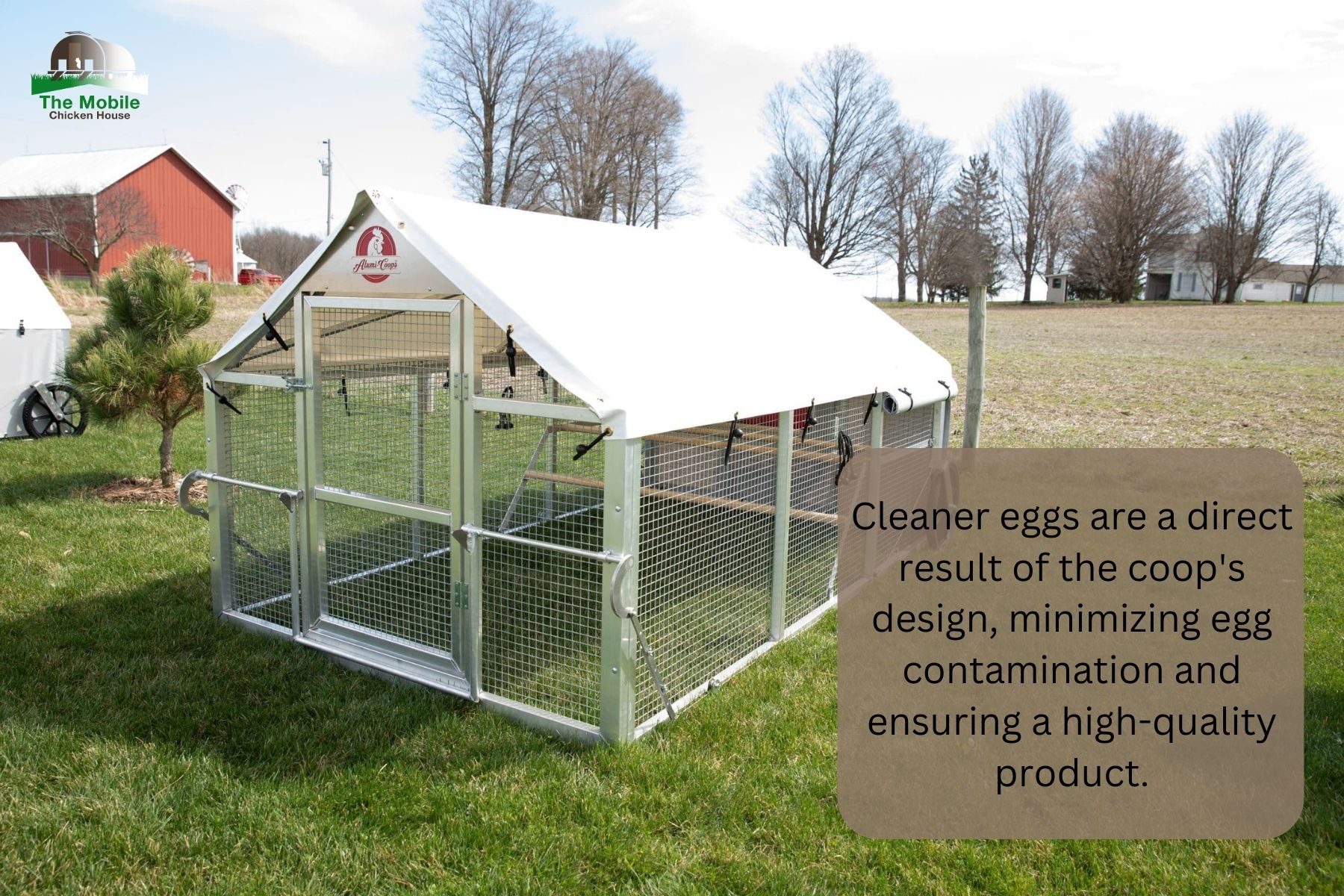Unlocking the Potential of Pastured Poultry and Livestock with The Mobile Chicken House
Are you interested in sustainable farming? Do you wish to create a balance between economic viability, environmental stewardship, and humane farming practices?
Then, we invite you to join us at The Mobile Chicken House in the journey toward more efficient, sustainable, and ethical farming practices. In this journey, we have prioritized revolutionizing the way we approach pastured poultry.
Do you want to learn more about it?
Let's get started!
Table of Contents
1. What Is Pastured Poultry?
2. Benefits of Pastured Poultry
3. Tips for Optimizing Pastured Poultry
4. Advanced Insights into Pastured Poultry Practices
5. A Technological Marvel for Pastured Poultry
6. Future Trends in Pastured Poultry and Sustainable Farming
7. A Harmonious Future for Farming
What Is Pastured Poultry?
At its core, pastured poultry is a simple but powerful concept. It's about giving our chickens and other livestock the freedom to roam on nutrient-rich pastures, mimicking their natural behaviors. The result? Happier, healthier animals and a more sustainable farming model.
And it's not just about chickens. Pasturing other livestock, such as cows and pigs, follows a similar principle. The idea is to let them graze and forage in a way that benefits both the animals and the land.
Benefits of Pastured Poultry
There are many benefits to pastured poultry. Let’s take a look at a few of them!
Economic Benefits
One of the most enticing aspects of pastured poultry is its positive impact on the bottom line. Lower production costs and increased profitability become achievable goals. This is especially true when coupled with the efficiency and mobility offered by portable chicken coops.
Environmental Benefits
Think of pastured poultry as a win-win for both the farmer and the earth. Not only does it reduce the negative impact on the environment, but it also improves soil health. And that's just the beginning! The biodiversity that naturally comes with pastured systems contributes to a healthier ecosystem overall.

Quality and Health Benefits
Happy birds lay tasty, nutrient-rich eggs, and pastured poultry ensures just that. Cleaner eggs and meat, coupled with the mental and physical well-being of the animals, make for a compelling case in favor of pastured practices.
In fact, Research from Penn State's College of Agricultural Sciences found that compared to eggs from conventionally-raised chickens, eggs from pasture-raised hens had:
- Double the amount of vitamin E and long-chain omega-3 fats
- More than twice the amount of total omega-3 fatty acids
- Less than half the ratio of omega-6 to omega-3 fatty acids
In addition to the extra nutrients, eggs from small farms are typically fresher because they are produced in small batches and sold quickly rather than sitting on the grocery store shelf for a few weeks.
Tips for Optimizing Pastured Poultry (and Livestock) Operations
How do you make sure you're getting the most out of your pastured operation? Here are a few things to keep in mind:
Rotational Grazing
Picture this: chickens blissfully pecking at fresh grass every day. That's rotational grazing at work. By regularly moving your poultry and livestock to different patches of pasture, you not only ensure their access to varied forage but also promote healthier pastures.
Diverse Forage
Nature loves diversity, and so do our animals. Providing a variety of forage options ensures they get a well-rounded diet. In the end, it makes for happier, healthier, and more productive livestock.
Pasture Management
Taking care of the land is as important as caring for the animals. Keep an eye on soil health. As you implement proper pasture rotation, you'll get to watch your pastures flourish.

Supplemental Feeding
Sometimes, a little extra goes a long way. Balanced supplemental feeding, the kind of made possible with our mobile range coop, ensures that your animals get the nutrients they need.
Biodiversity Promotion
Biodiversity isn't just a buzzword—it's a key player in the success of pastured systems. The more diverse your pasture, the more resilient it becomes.
Advanced Insights into Pastured Poultry Practices
Maybe you're thinking, "This all sounds great. But is there anything that actually proves this is a better way to raise chickens and care for your fields?"
Yes, there is! Let's take a look.
The Science Behind Rotational Grazing
Rotational grazing isn't just a farmer's intuition; it's backed by science. Understanding the biological and ecological principles behind rotational grazing sheds light on how this practice positively impacts soil health, pasture quality, and animal well-being.
Research studies reveal that regular rotations prevent overgrazing, allowing pastures to regenerate and supporting the growth of nutritious forage. This not only enhances the quality of the animals' diet but also contributes to sustainable land management.
The Nutritional Impact of Diverse Forage
Delving deeper into the nutritional aspects of forage, we discover that different plants offer a spectrum of essential nutrients. From clover providing nitrogen to legumes offering protein, a diverse forage diet ensures that animals receive a comprehensive array of vitamins and minerals.
Research findings underline the positive correlation between diverse forage and improved animal health. When you understand the nutritional needs of your poultry and livestock as a farmer, you are better able to tailor pasturing practices for optimal well-being.

Mastering Pasture Management Techniques
Beyond basic pasture rotation, mastering advanced pasture management techniques becomes crucial for long-term success. Soil testing, rotational planning based on forage growth cycles, and targeted interventions for common pasture issues elevate the sustainability of pastured systems.
Farmers who know how to address soil acidity, implement cover cropping, and incorporate rest periods into rotational plans become stewards of thriving pastures. The intersection of traditional wisdom and modern science becomes evident as we navigate the intricacies of pasture management.
Innovations in Supplemental Feeding
One thing to keep in mind is that supplemental feeding takes center stage in optimizing the health and productivity of pastured poultry and livestock. When farmers understand the specific nutrient requirements at different life stages of the animals, they can formulate custom feed blends.
As a side note, the synergy between advanced supplemental feeding strategies and The Mobile Chicken House's technology integration brings a new level of precision to poultry management. Automated feeders make sure your pastured poultry gets consistent nutrition. Portable systems allow for strategic placement. The marriage of innovation and tradition results in healthier and more productive animals.
Promoting Biodiversity for Resilient Ecosystems
If you zoom in on biodiversity, you uncover its far-reaching impact on the resilience of pastured ecosystems. The intricate web of relationships between plants, animals, and microorganisms contributes to pest control, disease suppression, and overall ecosystem health.
By consciously promoting biodiversity in pastured poultry and livestock systems, farmers become architects of robust ecosystems.
The Mobile Chicken House: A Technological Marvel for Pastured Poultry
Now that you know what pastured poultry is and you've become familiar with its benefits, maybe you're curious how to actually implement it. At The Mobile Chicken House, we can help you with that!
Efficiency and Mobility
The Mobile Chicken House is not just a coop but a technological marvel designed to elevate pastured poultry management. Its efficiency lies in its mobility, allowing farmers to effortlessly move their chicken houses from one area to another.
Rotational grazing becomes a seamless dance, with portable chicken coops leading the way. Chickens enjoy fresh forage regularly. The land benefits from the natural fertilizer deposited as the coop moves, enhancing soil fertility.
Technology Integration
Automatic feeding and lighting systems within our mobile chicken houses represent the pinnacle of technological integration in pastured poultry management. No more manual labor for farmers. The coop takes care of feeding schedules on its own. This makes sure that chickens receive their meals consistently.
Cleaner eggs are a direct result of the coop's design, minimizing egg contamination and ensuring a high-quality product. This technology-driven approach not only streamlines operations but also enhances the overall well-being and productivity of pastured poultry.

Advanced Insights into Pastured Poultry Practices
As we stand at the intersection of tradition and innovation, the future of pastured poultry and sustainable farming looks promising. Technological advancements will continue to shape mobile chicken houses, making them even more efficient and environmentally friendly.
Additionally, consumer awareness and demand for ethically produced food will further drive the adoption of pastured poultry practices. Farms that prioritize sustainability, biodiversity, and animal welfare will become leaders in the agricultural landscape.
Conclusion: A Harmonious Future for Farming
In the big picture of sustainable farming, pastured poultry, and livestock play center stage, and The Mobile Chicken House helps to make them successful.
Let's continue this journey together. We can create a future where happy birds, thriving pastures, and sustainable farming practices coexist together.
We would love to use our mobile chicken coops and our years of personal experience in the chicken business to help you run your business better.
The portable chicken coops we sell include:
Give us a call today to order your coop! We look forward to hearing from you.







